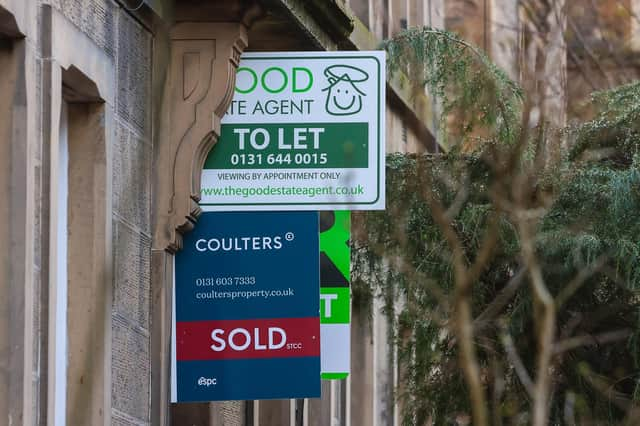Landlords face ban on rent increases under new Scottish Government plans


Landlords face being banned from increasing rent in certain areas under the Scottish Government’s new Housing Bill, with claims the move will only end up worsening the housing crisis.
Published on Wednesday, the Housing (Scotland) Bill will place a duty on local councils to carry out assessments within their areas on the state of the private rented sector, making recommendations to ministers about the imposition of rent controls.
Advertisement
Hide AdAdvertisement
Hide AdThe Bill – which comes against the backdrop of four local authorities declaring a housing emergency – does not specify particular controls which could be placed on landlords, but it does state rises would be capped during and in between tenancies. However, landlords have warned such a move will only deepen the crisis leading to reduced investment and more landlords leaving the sector.
Recommendations will go to ministers before being approved by Holyrood through secondary legislation.
Tenants’ rights minister Patrick Harvie said: “A fairer, well-regulated rented sector is good for both tenants and landlords.
“Tenants benefit from improved conditions and security, while good responsible landlords will thrive when their good practice is recognised by regulation.
“Scotland has led the way across the UK in improving the experience of people who rent their homes and this reform has been at the same time as significant growth in the size of the private rented sector.
“Progressive reform can lead to better conditions and a healthy rented sector overall. I want to keep working with both tenants and landlords to achieve that goal.”
But the Scottish Association of Landlords said the Bill will “do nothing” to improve the private rented sector for tenants or landlords.
Its chief executive John Blackwood said: “The rent control proposals, as has been seen in places like Ireland which has similar measures, will see reduced investment and more landlords leaving the sector, leading to higher costs for tenants.
Advertisement
Hide AdAdvertisement
Hide Ad“The effects of Scottish Government policies in the private rented sector are already being felt, with rising costs reducing supply and placing more pressure on council and housing association properties that they are struggling to cope with.”
Landlords, he added, are pushing for more social housing and owner-occupier homes to be built, along with encouragement in investment into the private rented sector.
Tenants’ union Living Rent welcomed the proposals in the Bill, claiming renters are currently being “pushed to the edge by unaffordable rents”.
Its secretary Aditi Jehangir said: “If passed, these will have a huge impact on tenants’ lives, ensuring that we have homes that we can actually call ours.”
As well as changes to the private rental sector, the Bill proposes duties on public authorities – including councils, the police and the health service – to ensure people do not become homeless.
Through what is described as an “ask and act” approach, public bodies will be required to inquire about the housing circumstances of those they interact with and provide support or refer them to their local authority, which will be required to act six months before homelessness is imminent, instead of the current two months.
The Bill would also update the definition of domestic abuse in current housing legislation and force social landlords to devise a policy to support tenants at risk of homelessness because of abuse.
Scottish Labour described the proposals as “half-baked”.
Housing spokesman Mark Griffin said: “This Bill exposes the fact that the SNP Government has no clear plan to tackle the housing crisis and homelessness in Scotland after 17 years of failure and decline.”
Comments
Want to join the conversation? Please or to comment on this article.